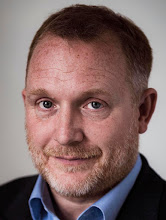Today we launched a new learning programme for Bankers called SMART CB. Together with the Chartered Institute of Bankers in Scotland, we are offering a fast track route for senior managers to obtain Chartered Banker status. Below is an excerpt from my speech at the launch event.
"I should like to tell you a little story to underline the importance of professional standards in banking that is a little closer to home than you might expect.
I want to tell you about my great-great-grandfather, George.
From the early 19th century the Greenways were bankers in Warwick. Although initially very successful, the bank was taken over by my great-great-great-uncle Kelynge Greenway after the death of his father. Under the terms of his father's will, £25,000 in capital was removed from the bank leaving just seven pounds to the remaining partners. That the bank survived the withdrawal of £25k at all, is a testament to its strength up to this point. What happened next is an object lesson in how NOT to run a bank.
Kelynge asked his brothers, Thomas (a Colonel in the army), George (a solicitor and my great-great- grandfather) and Charles (an architect) to join him in the bank. Now, you would have thought that with only seven pounds to their name, they would take the opportunity to recapitalise the bank.
But no, they decided instead to run the bank with NO CAPITAL WHATSOEVER! According to the British Banking History Society in December 1886 of the banks £278,000 of assets, £210,000 were the partners' overdrawn accounts and this included extensive tramway speculation (grandpa George was also the Chairman of the Magdeburg Tramway Company).
The bank failed on September 6th 1887 after their agents in London, Glynns, refused to honour their cheques and the trial of the partners began on October 27th. George was sentenced to five years' penal servitude and Kelynge to 12 months' hard labour, Thomas escaped sentence due to his "almost complete ignorance of banking" and Charles had died five years previously.
My grandfather Walter told me that his father Cate (who had been 11 at the time of the crash) never spoke of the affair. One can only speculate on the impact it would have had on a young boy but he overcame it, rising to the rank of Lieutenant Colonel in the army, serving in India and China ultimately winning the DSO at Gallipoli. Indeed you will be glad to hear, my family has steered clear of banking since; sticking almost exclusively to the things it knows about namely teaching and the military.
I think it is safe to say that neither George, Thomas or Charles knew of the canons of lending; still less of how to properly assess credit risk. It is clear they knew absolutely nothing of best practice in capital ratios.
I think it is also safe to say that my family knows the fundamental importance of professional standards in banking.
Mark Twain once said, "History never repeats itself but it often rhymes". I don't think you need me to point out the parallels between my ancestors' short-comings as bankers and the factors which contributed to our current economic situation.
There is a wealth of knowledge in the path to Chartered Banker and knowledge is, I believe, the only long term way to profit. I hope it is a path that you join us on."
I thought I'd share this here as it was only through working with CIOBS that I found out about this element of my family history.
it’s political
4 days ago

No comments:
Post a Comment